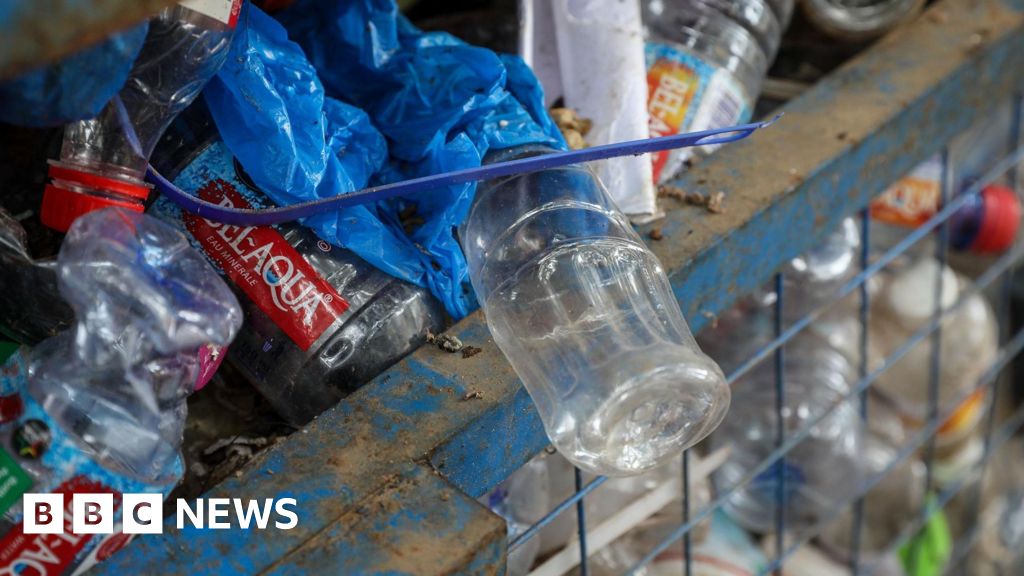Science
Nations Converge in Geneva to Address Global Plastic Crisis

Countries worldwide are convening at a UN conference in Geneva on March 5, 2024, to negotiate a legally binding treaty aimed at combating the escalating plastic crisis. Despite an agreement in 2022 to establish a framework to address plastic waste and harmful chemicals, progress has stalled over the past two years, leaving many to wonder if this latest gathering will yield tangible results.
Plastic production has surged dramatically over the last century. While some regard it as a revolutionary material, others view it as an environmental disaster. Current estimates indicate that there are nearly 200 trillion pieces of plastic in the world’s oceans, a number that may triple without intervention. According to Dr. Alice Horton, a research scientist at the National Oceanography Centre, the rapid proliferation of synthetic plastics has occurred within a remarkably brief period in human history.
“Proportional to life on Earth, plastics have been around for no time at all,” Dr. Horton explained. “We are suddenly realizing there may be problems with it.” The scale of plastic production has skyrocketed from 2 million tonnes in 1950 to 475 million tonnes by 2022. Although recycling is possible, only about 10% of plastic is effectively recycled, with around 60% categorized as single-use.
The environmental implications are dire. Marine life is particularly vulnerable, as plastic debris can be ingested or lead to entanglement in discarded fishing gear. Zaynab Sadan, global plastics policy lead at WWF, underscores the threat posed to wildlife, stating, “They can confuse it as food, which then harms their internal organs and can lead to fatalities.”
As plastics break down into smaller particles known as microplastics, their presence has been detected in various ecosystems, from the deep sea to mountain tops. Ongoing research aims to determine the extent of their impact on different species. Dr. Horton cautions that there is a critical threshold where organisms begin to suffer health consequences, including inflammation and hormonal changes, potentially leading to disease or death.
The human health implications of plastic exposure are equally alarming. A recent report by The Lancet Countdown estimates that the health impacts associated with the plastic crisis cost approximately $1.5 trillion annually in health-related damages. The report highlights a concerning lack of transparency regarding the chemical composition of plastics, noting that more than 16,000 chemicals are used in plastic production, many of which are toxic.
Despite the growing evidence of the hazards associated with plastic, negotiations for a global treaty have been fraught with challenges. The deadline for reaching an agreement was set for December 2024, but after five rounds of discussions, no treaty has materialized. The upcoming conference in Geneva will see more than 170 nations attempt to forge a consensus on critical issues, including consistent design standards for products to facilitate recycling and reduce reliance on virgin plastics.
Rob Opsomer, executive lead of plastics and finance at the Ellen MacArthur Foundation, emphasized the importance of setting design standards. “For example, a colored drinks bottle has half the value of a clear, uncolored bottle when recycled,” he noted.
Support for an ambitious treaty is strong, with nearly 100 countries, including the UK, advocating for measures to limit production levels. However, opposition from oil-producing nations, such as Russia and Saudi Arabia, complicates these negotiations. They argue for a greater focus on enhancing recycling capabilities rather than reducing production.
The move toward greener technologies is projected to peak global oil demand in the coming years, potentially leaving plastics as one of the few growth markets for the oil industry. Consequently, any efforts to restrict plastic production could have immediate economic repercussions for petro-states.
Businesses are equally impacted by the lack of clear regulations. Opsomer stated, “It is a fundamental risk. Businesses don’t want packaging with their brand name on it to be littering the streets and our oceans.” The absence of a coordinated framework for plastic management imposes significant costs on businesses, which must navigate a patchwork of regulations.
The Business Coalition for a Global Plastics Treaty, which includes major corporations such as Nestle and Unilever, is advocating for coordinated taxes to assist with the costs of recycling and addressing plastic waste.
As nations gather in Geneva, the urgency to confront the plastic crisis has never been more critical. Individuals can also take action by reducing single-use plastic consumption. Simple changes, such as opting for reusable containers or taking a reusable bag for groceries, can significantly mitigate plastic waste.
With the future of global plastic management hanging in the balance, the outcome of this conference could shape the trajectory of environmental policy for years to come.
-

 World4 days ago
World4 days agoCoronation Street’s Shocking Murder Twist Reveals Family Secrets
-

 Entertainment4 months ago
Entertainment4 months agoKate Garraway Sells £2 Million Home Amid Financial Struggles
-

 Entertainment3 months ago
Entertainment3 months agoAnn Ming Reflects on ITV’s ‘I Fought the Law’ Drama
-

 Health3 months ago
Health3 months agoKatie Price Faces New Health Concerns After Cancer Symptoms Resurface
-

 Entertainment4 weeks ago
Entertainment4 weeks agoCoronation Street Fans React as Todd Faces Heartbreaking Choice
-

 World4 weeks ago
World4 weeks agoBailey Announces Heartbreaking Split from Rebecca After Reunion
-

 Entertainment7 days ago
Entertainment7 days agoTwo Stars Evicted from I’m A Celebrity Just Days Before Finale
-

 World7 days ago
World7 days agoKevin Sinfield Exceeds Fundraising Goal Ahead of Final Marathons
-

 Entertainment3 months ago
Entertainment3 months agoCoronation Street’s Carl Webster Faces Trouble with New Affairs
-

 Entertainment3 months ago
Entertainment3 months agoWhere is Tinder Swindler Simon Leviev? Latest Updates Revealed
-

 Entertainment4 months ago
Entertainment4 months agoMarkiplier Addresses AI Controversy During Livestream Response
-

 Science2 months ago
Science2 months agoBrian Cox Addresses Claims of Alien Probe in 3I/ATLAS Discovery





















